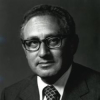Henry A. Kissinger

Henry A. Kissinger
Henry Alfred Kissingeris an American diplomat and political scientist. He served as National Security Advisor and later concurrently as United States Secretary of State in the administrations of presidents Richard Nixon and Gerald Ford. For his actions negotiating the ceasefire in Vietnam, Kissinger received the 1973 Nobel Peace Prize under controversial circumstances, with two members of the committee resigning in protest. Kissinger later sought, unsuccessfully, to return the prize. After his term, his advice has been sought by world leaders...
NationalityGerman
ProfessionStatesman
Date of Birth27 May 1923
CountryGermany
I don't think we should pay people to fight terrorism. I would be amazed if they asked for anything in return.
The position is that stability and peace in Asia depend on a cooperative relationship between China and the United States.
I would have said, before the World Trade Center events, that he would try to get a normal relationship with China - making clear to China what the limits are of what America can accept, but also showing understanding for some of Chinese necessities. I thought he was moving towards the position that I have more or less advocated.
Well, he keeps saying that, and as defense secretary, of course he has to think of a lot of potential enemies. I do not think it's a wise course to articulate this or to base our policy on it. And I do not see under modern circumstances what we would be fighting about.
Deng Xiaoping thought of himself as a great revolutionary and a great reformer. He had dismantled the Chinese communist management of the economy. In my next-to-last conversation with him, which was about six months before Tiananmen Square, he said to me that his aim would be the next phase to reduce the Communist Party to philosophical issues. And I said, "What's a philosophical issue?" And he said, "Well, like if we make an alliance with Russia." Given his view of Russia, that was not the likeliest thing that would ever happen.
The defining issue is that the government in Taiwan was considered to be the government of all of China, and the authorities in Beijing were not recognized as a government of China. So Taiwan was the residuary for all of China.
Realism in foreign policy means careful consideration of all aspects pertinent to the issue, before taking a decision. This is the only way you can move from where you are to someplace else.
The Western concept of democracy is based on the idea that the loser of an election has the possibility next time round of being the winner. But in the case of an ethnically or religiously divided country, in which minorities don't live peacefully together, this necessary balance can't be properly guaranteed by democracy. When each ethnic group arms itself, it is not surprising that the army of a new state is viewed by part of the population as an ideological militia.
For my generation the relationship with Europe was the central point of American foreign policy. Even during my time in government there was disagreement, sometimes very strong disagreement. But they were all like arguments within a family. I am not sure if the generation which doesn't have these experiences has the same view of things.
Obama is like a chess player who is playing simultaneous chess and has opened his game with an unusual opening.
There is no realism without an element of idealism.
I do not criticize people who take a public stand on human rights issues. I express my respect for them. But some people are more influential without a public confrontation.
The American formal position has been that we oppose violence by governments against their people. That principle should not be abandoned.
I have learned, as I wrote, that history must be discovered, not declared. It's an admission that one grows in life.